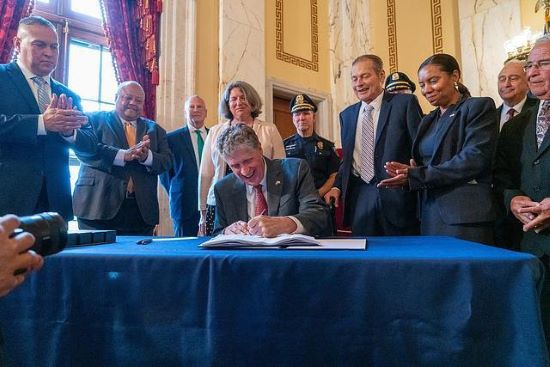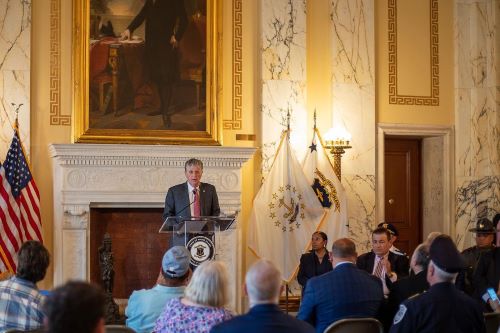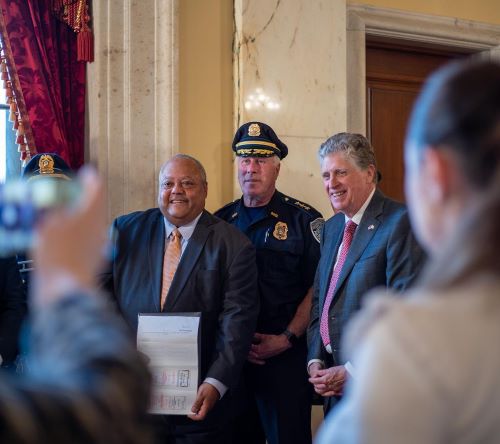Governor McKee Signs Law Enforcement Officers’ Bill of Rights Reform Legislation Into Law

PROVIDENCE, RI — Governor Dan McKee, joined by Lt. Governor Sabina Matos, House Speaker K. Joseph Shekarchi (D-Dist. 23, Warwick) and bill sponsors Senate President Dominick Ruggerio (D-Dist. 4, North Providence, Providence) and Representative Raymond Hull (D-Dist. 6, Providence, North Providence), signed the Law Enforcement Officers’ Bill of Rights (LEOBOR) reform legislation today in a State Room ceremony. Included in the speaking program were Senator Dawn Euer (D-Dist. 13, Newport), North Providence Mayor Charles Lombardi, representing the Rhode Island League of Cities and Towns, and Warwick Chief of Police Colonel Bradford Connor, President of the Rhode Island Police Chiefs Association.
“Today’s bills answer the public’s call for greater transparency around potential police misconduct, while safeguarding officers’ rights to due process,” said Governor Dan McKee. “By signing this legislation into law today, we have made sure that police chiefs are able to be more transparent with the public about misconduct investigations. It also makes sure that chiefs have the tools they need to ensure accountability within their departments.”
Governor McKee added, “In my State of the State, I reinforced the need for consensus and action on LEOBOR, and I am grateful to the Speaker and the Senate President for their leadership in bringing these reforms across the finish line. I thank all the legislators, members of law enforcement and stakeholders who worked collaboratively to deliver this bill.”
Several years in the making, the LEOBOR reform legislation expands the membership of a police misconduct hearing committee from three to five, adding a retired justice or judge from the Supreme Court and an attorney to the committee. The three police officers serving on the committee must be randomly selected from a list of those who have completed training in disciplinary action. The attorney must be selected by the chief justice in consultation with the Supreme Court’s committee on racial and ethnic fairness and the Rhode Island Bar Association’s committee on diversity, equity and inclusion.

Other reforms include expanding an officer’s maximum two-day suspension without pay to a two-tier system, one with a maximum five-day suspension without pay for lesser offenses and a second, more severe tier with a maximum 14-day suspension without pay. In a criminal case, when a law enforcement officer pleads guilty, enters an Alford plea or pleads nolo contendere to a felony charge, that officer will be dismissed by law enforcement.
Additional reforms relate to increased transparency and allow police chiefs to make public statements and release video evidence for more serious offenses prior to a decision being rendered. Moreover, the Rhode Island Police Officers Commission on Standards and Training must publish to its website the status of all pending misconduct hearings, as well as any decision, order or action indicating an officer’s guilt.

“I am proud of the LEOBOR bills, which were negotiated with the participation of the House and Senate, the police unions, the police chiefs and other interested parties. Both chambers have been working on this issue for over two years with the goals of achieving due process, accountability, and transparency,” said Speaker K. Joseph Shekarchi. “It has been decades since we have been able to address police misconduct in such a meaningful and substantive way. We recognize the important work that law enforcement does in our communities. However, the status quo is unacceptable and these bills create a framework to address police misconduct.”
“I am grateful to the many stakeholders from all sides of this issue who have worked over the past several years to develop and refine this legislation,” said Senate President Dominick Ruggerio. “While there will be some who say this bill goes too far and others who say it doesn’t go far enough, I think the bill strikes a responsible balance that brings necessary and appropriate reforms to LEOBOR. Throughout this process, we who worked on it in the Senate sought to both recognize the unique and dangerous work of the dedicated law enforcement officers who keep our communities safe and to improve the tools available so that those who violate the public trust can be held accountable. This bill is a reasonable, responsible compromise developed over the course of several years and consistent with the recommendations of the Senate study commission that intensively reviewed this issue.”
“Reform to LEOBOR has been a long time coming and this legislation will not only deliver transparency and accountability to the public, but it will also help police departments across the state root out misconduct in a fair and just way. When facing the polarization and cynicism that is currently plaguing our society, trust in law enforcement is even more crucial to preserve public safety and I believe this bill can restore that trust between the officers who selflessly protect all of us and the people that they serve,” said Deputy Speaker Raymond Hull.
“The League applauds the collaborative efforts of the Governor, House, Senate, police chiefs and officers in order to reach consensus on meaningful reforms to the Law Officers’ Bill of Rights,” said Charles Lombardi, North Providence Mayor and President of the R.I. League of Cities and Towns. “Addressing serious flaws in the system and improving transparency will greatly increase trust among members of the community. We thank the honorable, professional officers for their service to our communities.”
“Public trust is the most important tool we have as police officers, and this new law increases transparency and will help us grow that trust,” said Colonel Bradford Connor, President of the Rhode Island Police Chiefs Association and Chief of Police for Warwick. “We are grateful for the opportunity to collaborate with legislative leaders and community advocates on this legislation and to have a true voice in this legislative process.”
The LEOBOR reform legislation will be effective January 1, 2025.